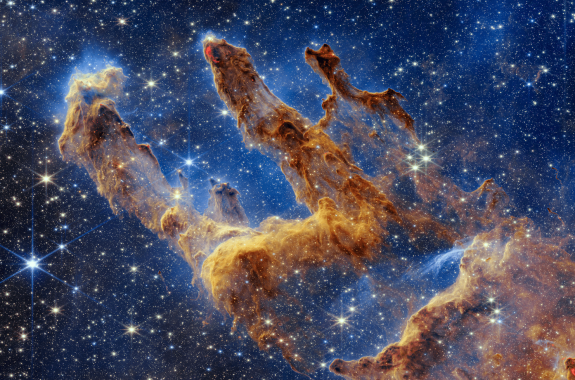On Today's Podcast
The Evolution Of An Enzyme Engineer Who Changed Chemistry
Frances Arnold's game-changing technique of "directed evolution" creates enzymes with unusual capabilities. Her own evolution made it possible.
Listen NowFebruary 27, 2026
A new simulation shows large amounts of hydrogen in our planet’s core. Scientists report on what they found in 290-million-year-old vomit. Plus, a comedic play and a 20-year neurology study explore what we can do to prevent dementia and cognitive decline. And, a federal law aims to close the legal loophole that lets stores sell THC products from hemp.
Listen To Ethereal Sounds Derived From Space
NASA’s Sonification Project aims to turn astrophysics data into sound, enabling visually impaired people to engage with outer space.
17:13
How Shoddy Science Is Driving A Supplement Boom
Questionable science, lax regulations, and wellness culture have turned dietary supplements into big business.
After CDC Director Is Ousted, More Senior Officials Resign
Former CDC scientist Demetre Daskalakis left his post, citing political interference and a lack of science in decision-making at the agency.
Meet 3I/Atlas, An Object From Another Solar System
The third interstellar object ever observed is in our neighborhood—for now. And, asteroid Bennu could contain dust from far-off solar systems.
Monarchs of the Sea: The Extraordinary 500-Million-Year History of Cephalopods
Three hearts, eight arms, and a storied rule of the oceans. Read Danna Staaf’s ode to octopuses (and squid) with SciFri this June.
Many Things Under a Rock: The Mysteries of Octopuses
Octopuses seem otherworldly, and author Davis Scheel unearths just how much there is left to learn about these charismatic cephalopods.
How Common Household Products Pollute Our Indoor Air
Candles, hairstyling products, and other common items can produce toxic air pollution that lingers in our homes.
The Shape-Shifting Science Of Sand Dunes
A sand dune is much more than just a big pile of sand. But how do they work? And what else do scientists want to know about sand?
17:03
Food Science Experts On Perfecting At-Home Ice Cream
We’re pulling a few of our favorite stories about the science of ice cream out of the freezer.
Managing Wildfires Using A Centuries-Old Indigenous Practice
The Karuk Tribe in Northern California has stewarded its home using prescribed burns for millennia. Now, they’re training others on the skill.
‘Orbital’ Imagines The Inner Lives Of Astronauts On The ISS
The award-winning novel explores the inner thoughts of astronauts during a single day aboard the International Space Station.
Why ‘The Toxic Avenger’ Has Kept Our Attention For Over 40 Years
The superhero satire that’s “the lowest brow you can go” has a secret identity—a message about environmental justice.
An ER Doctor Reflects On Hurricane Katrina, 20 Years Later
Dr. Erica Fisher was working at Charity Hospital when it flooded, trapping her and 1,600 other people inside during Hurricane Katrina.
An Archaeologist And A Tattoo Artist Decipher Ancient Ink
Archaeologists are taking another look at tattoos on preserved corpses and verifying ancient techniques with modern tattoo artists.
Science Friday Live In Burlington, Vermont!
Join the Science Friday team in Burlington on Friday, October 17, for a special live stage version of the beloved radio show!
A Blind Inventor’s Life Of Advocacy And Innovation
In “Connecting Dots: A Blind Life,” inventor Josh Miele recounts his life story and path to becoming an accessibility designer.
12:05
How Have Gray Wolves Fared 30 Years After Reintroduction?
Humans drove wolves nearly to extinction in the American West. Reintroducing them in 1995 was, and still is, controversial.
Are Animal ‘Pests’ Really The Villains We Make Them Out To Be?
Science writer Bethany Brookshire’s book tries to untangle why we call some animals “pests.”
17:02
Are Food Dyes Really Bad For You?
The FDA and HHS plan to eliminate petroleum-based food dyes as part of the MAHA agenda. What does science say about their effects on health?
12:12
What Lies Beneath The Outer Layers Of A Star?
Astronomers found a supernova whose lighter outer layers had been stripped away, revealing an inner shell rich in silicon and sulfur.



















